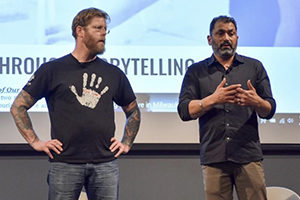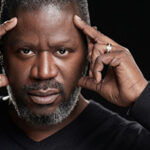Forgiveness in the face of violence and hate will be the focus of a talk at UWM that features a former white supremicist and the son of a man killed in a mass shooting in 2012 at a Sikh temple in Oak Creek.
Pardeep Singh Kaleka and Arno Michaelis, authors of “The Gift of Our Wounds: A Sikh and Former White Supremacist Find Forgiveness After Hate,” will share their experiences with violent hate crimes against racial and religious groups in the wake of the massacre.
Hosted by Boswell Books, the talk is scheduled for Nov. 25 in the Wisconsin Room of the UWM Student Union. A free book-signing will follow.

The event is part of the Chancellor’s Care, Respect and Expressions lecture series. The yearlong series promotes dialogues on inclusivity and encourages caring and compassionate action in the collegial community, according to Joan Prince, UMW vice chancellor for Global Inclusion and Engagement.
“An institution of higher learning has the tools, opportunities and venue to bring people together to have these difficult dialogues,” Prince said. “This is a real-time story of how those who either embraced hate or felt that they could espouse hate because of personal injury decided that it was more important to come together and work towards a society that promoted forgiveness and civility.”
‘How do we heal?’
Kaleka’s father was one of six people killed by a white supremacist at the Sikh Temple shooting.
“How do we heal?” Kaleka asked. “How do you move forward as a community and as a country?”
A former Milwaukee police officer, inner city educator and Marquette University alum, Kaleka has been working as a therapist treating survivors of assault, abuse and violence. He also founded a youth organization called Serve 2 Unite, which connects religious and cultural communities in Milwaukee. As a first-generation immigrant from Punjab, India, Kaleka inspires dialogues on issues of cultural identity and recovery.
“I think the danger of not engaging in this type of dialogue is that we continue to build a more rejectionist world,” Kaleka said. “When you have a more rejectionist world with people in that world becoming leaders, it’s just going to get further divided and become much more dangerous.”
Unlikely friends
There was a time when Kaleka and Michaelis were unlikely to be friends. As a leader of a worldwide racist skinhead group, Michaelis led a self-declared racial holy war against Jewish people and minorities as part of a white power movement. In Wisconsin during the late 1980s and early 1990s, his hate-metal band Centurion sold more than 20,000 CDs to a primarily racist following.
But Michaelis reported a change of heart after learning to embrace diversity and practice gratitude. Now a father, author, filmmaker, educator and speaker, he and Kaleka advocate for tolerance and forgiveness to construct unity.
“The myriad of challenges globally, nationally and locally around how individuals of diverse backgrounds are struggling to come together to promote a civil society is the impetus for campus and community to come together and hear the astounding stories of these two gentlemen,” Prince said. “It is hopeful that a ‘spark’ of understanding and realizing that we are stronger together than we are separately as a community and region will radiate.”
Named Booklist 2018 Editor’s Choice, “The Gift of Our Wounds” approaches topics like immigration, culture, racism, identity, compassion and forgiveness through Kaleka and Michaelis’s first person narrative.
In addition to their book, Kaleka and Michaelis have worked with the Forgiveness Project to share their stories and produce restorative narratives of the human spirit. The Forgiveness Project is a collaboration of testimonials shared by survivors of hate crimes that raise awareness of the cyclical injustices rooted in an intolerant society. The project spans a variety of publications, educational resources and platforms that stir public conversations on topics like the organization’s RESTORE prison program, which has won awards for its rehabilitative impact on American prisoners.






